Christopher Isherwood - A Gay Role Model
For a long time, Christopher Isherwood (1904-1986) was my model of intellectual and sexual honesty.
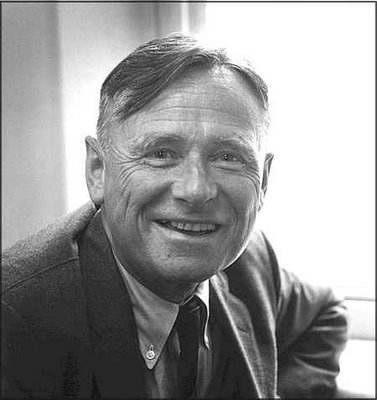 I came across Isherwood, as did many others, through the film 'Cabaret'. And went on to read the book - 'I am a Camera'. And other works - particularly being taken with 'Goodbye to Berlin', 'Mr Norris Changes Trains', and 'Down There on a Visit', 'Lions and Shadows', 'The Memorial' and 'Christopher and his Kind'.
I came across Isherwood, as did many others, through the film 'Cabaret'. And went on to read the book - 'I am a Camera'. And other works - particularly being taken with 'Goodbye to Berlin', 'Mr Norris Changes Trains', and 'Down There on a Visit', 'Lions and Shadows', 'The Memorial' and 'Christopher and his Kind'.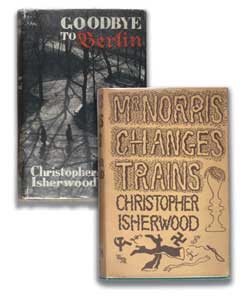 In terms of intellectual bravery, I loved the way, for example in 'Christopher and His Kind' (1977), he could examine his early novels and unmask the then often unconscious workings out of his psyche and general motivations though their characters and situations. And expose the disceptions he practiced on himself at the time with respect to these. And tangentially, this later examination throws light on the creative process itself, when it is a mix of autobiography and imagination.
In terms of intellectual bravery, I loved the way, for example in 'Christopher and His Kind' (1977), he could examine his early novels and unmask the then often unconscious workings out of his psyche and general motivations though their characters and situations. And expose the disceptions he practiced on himself at the time with respect to these. And tangentially, this later examination throws light on the creative process itself, when it is a mix of autobiography and imagination.'Down There on a Visit' is another great read - four stories, each dealing with one character. I love 'Paul' best - the fabulous beauty, who, Dietrich-like, does sex disinterestedly and often only because others are obsessed with him, and because it takes him into society and a certain kind of jet-set lifestyle. But who then surprisingly out-spiritualises Isherwood, his supposed mentor.
Isherwood's American years were interesting for me for this spiritual journey. The British writer had embrassed Hinduism and the teachings of Swami Prabhavananda:
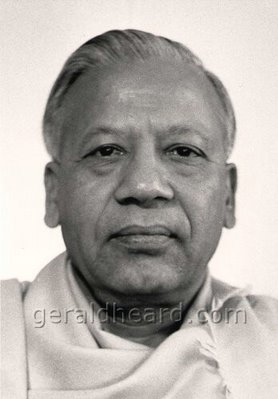 This he documented in 'My Guru and his Disciple', reviewed by Edmund White for The New York Times Book Review:
This he documented in 'My Guru and his Disciple', reviewed by Edmund White for The New York Times Book Review:"It is a sweetly modest and honest portrait of Isherwood's spiritual instructor, Swami Prabhavananda, the Hindu priest who guided Isherwood for some thirty years. It is also a book about the often amusing and sometimes painful counterpoint between worldliness and holiness in Isherwood's own life. Sexual sprees, all-night drinking bouts, a fast car ride with Greta Garbo, script-writing conferences at M-G-M, and intellectual sparring sessions with Bertolt Brecht alternated with nights of fasting at the Vedanta Center and a six-month period of celibacy and sobriety. Seldom has a single man been endowed with such strong drives toward both sensuality and spirituality, abandon and discipline. . . . In these pages, Isherwood has reinvented the spirit of devotion for the modern reader."
Isherwood wrote several books with Prabhavananda, and translated various works on Indian Vedanta. In all this, he was important for me - his fame and prostheletizing brought such ideas into my anglosaxon culture and personal awareness, things that at the time were not so immediately accessible outside sub-continent.
But it was his early 1930's Berlin years that maybe fasinate the general reader most. Isherwood taught English, and haunted the Cosy Corner cafe, where the working-class boys traded sex for money. And he wrote 'Mr Norris Changes Trains' and the stories that formed 'Goodbye to Berlin', capturing these experiences. He met his first longer-term relationship, Heinz, through the cafe and tried unsuccessfully to get the boy to England before World War Two. Heinz subsequently joined the German Army and disappeared into history.
Following up White's comment on Isherwood's seemingly contradictory spiritual-sexual nature, I'm sure the writer would not disapprove of a glance towards his earlier obsession with muscular working class boys, often tough, self-reliant and independent. My tribute is in the form of hot young guys that are often out in nature in some way:
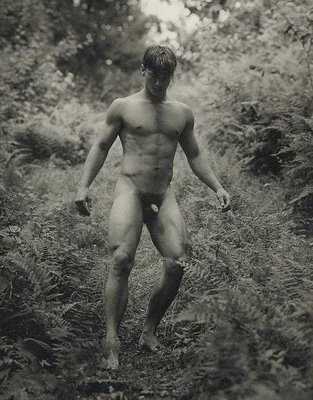
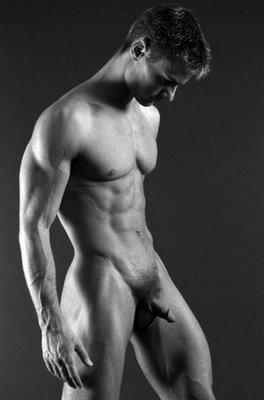
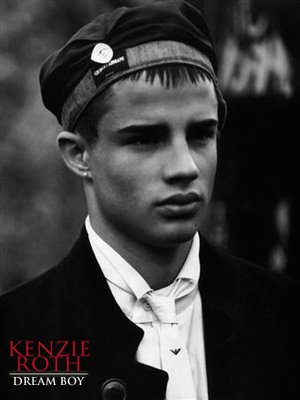


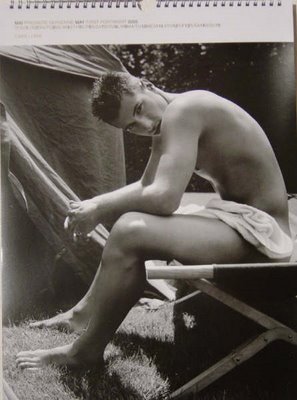
 I selected black and whites, cos they better (faintly) echo the Berlin of the Weimar Republic.
I selected black and whites, cos they better (faintly) echo the Berlin of the Weimar Republic.

No comments:
Post a Comment